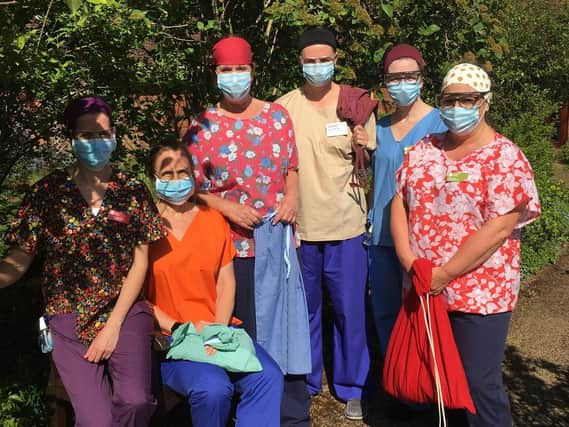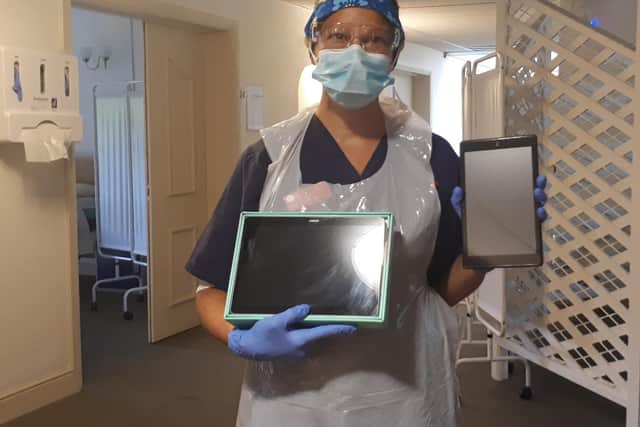Volunteers help Katharine House Hospice through COVID-19 pandemic and beyond


The Katharine House Hospice wouldn’t have been able to achieve its high level of care without the support of the local community, giving money, in-kind donations and their time through volunteering during the COVID-19 pandemic.
Katharine House Hospice was faced with a rapid change when COVID-19 hit the UK. Over one weekend in April, plans to turn it into a COVID response centre were put into place.
Advertisement
Hide AdAdvertisement
Hide AdAfter the shock of the speed of change to become a response centre, the realisation about the increased need for personal protective equipment (PPE) followed.


The hospice put out a call to the community as they were desperately short and struggling to find sources for the equipment from anywhere.
The community, including local dentist surgeries, beauticians and hairdressers, were incredibly generous, sending gloves, masks and aprons to the hospice. Some local schools made visors for the hospice too. It had a significant effect on the hospice’s ability to carry on their work.
Angharad Orchard, chief executive of Katharine House, said: “We always knew we had incredible support from our community for the work we do, but these generous acts during such a difficult time for everyone in the country, was incredibly strengthening.”
Advertisement
Hide AdAdvertisement
Hide AdOne fundamental change at the hospice was that they were unable to routinely allow visitors into the building. Family and friends were unable to come in to offer comfort to each other and their loved one, except at the end of life.
But again, through the generosity of the public, technology helped to keep families together. Many mobile phones and tablets were donated to the hospice, which were invaluable in keeping patients and their families connected.
Helen Fletcher, head of the inpatient unit, added: “We were running on adrenaline with the anxiety of what we were exposing ourselves to and the risks not only to us but the people around us.
"It’s been an enormous undertaking. We’ve been caring for patients with COVID-19, but we’ve also had our own palliative care patients, separated from loved ones at the end of their lives. We are so grateful to everyone who donated tablets, so patients could keep in touch with their families.”
Advertisement
Hide AdAdvertisement
Hide AdMandi Kitching is Katharine House’s Hospital Palliative Care Nurse based at the Horton Hospital. She supports NHS staff in caring for patients with complex symptoms and those at the end of their lives.
Mandi said: “Families not being able to visit their loved ones in their final days was one of the hardest things to deal with. We went to great efforts to keep them updated through regular telephone calls from the nursing and medical team. We used tablets to enable virtual visiting and give families virtual tours of the unit where their loved one is being cared for.”
The hospice has an incredibly large and loyal volunteer network. For many of them, the pandemic crisis meant that their volunteering roles were temporarily stopped - like those working in the six charity shops, for example - or they had to pause in their support because they were shielding themselves or others. But for others, their work at the hospice changed and grew.
For example, the bereavement team volunteers continued to support existing clients and extended their reach into supporting new clients in different ways through telephone contact and virtual platforms. Ward clerks and catering volunteers retrained as receptionists, and the hospice also welcomed new volunteers from the community, such as registered general nurses, healthcare assistants, family liaison support and housekeepers.
Advertisement
Hide AdAdvertisement
Hide AdReceptionists who had a nursing background also went back to the ward as healthcare assistants, including Judy, who said: “I have been working at Katharine House as a volunteer receptionist for almost three years and I have found it very fulfilling.
"As a retired nurse, when an email arrived asking for more nurses, as the hospice prepared for COVID-19 and its possible ramifications, I felt very much I should help. I volunteered as a healthcare assistant.
"My first shift was to be a night shift and I admit I was very nervous. Not only was it over 40 years since I had worked a night shift, I also had to cope with assisting the nurses to care for patients with COVID. On my way to work that night I realised I could still enjoy the work and indeed I did.”
If you wish to find out more about Katharine House’s work, make a donation or join in on one of their fundraising events, go to their website at www.khh.org.uk.